
Topics
As speculation grows that Libby and Karl Rove could be indicted, we speak with Waas on his new expose that Libby never told prosecutors that in June 2003 he spoke with New York Times reporter Judith Miller about CIA operative Valerie Plame and her husband Ambassador Joseph Wilson, a critic of the Iraq war. Miller will testify once again today about their conversations. [includes rush transcript]
Speculation is growing in Washington that Vice President Dick Cheney’s chief of staff Lewis “Scooter” Libby and President Bush’s top advisor Karl Rove could soon be indicted by a federal prosecutor investigating the outing of CIA agent Valerie Plame.
Investigative Journalist Murray Waas is reporting in the National Journal that Libby failed to tell the grand jury about a discussion he had with New York Times reporter Judith Miller in June 2003–weeks before Plame’s name first appeared in the press. Federal Prosecutor Patrick Fitzgerald only learned of the discussion after Miller announced last week that she had discovered a set of notes on the conversation. Fitzgerald, who has been investigating the case for nearly two years, has now asked Miller to testify again today before the grand jury.
Meanwhile, the Wall Street Journal reports Fitzgerald’s pursuit now suggests he might be investigating not a narrow case on the leaking of the agent’s name, but perhaps a broader conspiracy. The Journal reports at least part of the outcome likely hangs on the inner workings of what has been dubbed the White House Iraq Group which was set up to sell the Iraq war to the American public. Libby and Rove were instrumental in the group. Plame’s name was leaked only after her husband, Ambassador Joseph Wilson, publicly revealed that the Bush administration had lied when it claimed Iraq was trying to purchase enriched uranium from the country of Niger in order to build nuclear weapons. Wilson has long accused the White House of outing his wife as an agent in an effort to smear him.
- Murray Waas, investigative journalist who writes for a number of publications. Among them, American Prospect magazine and Salon.com. He has broken a number of stories on the saga of the outing of CIA operative Valerie Plame. He maintains a blog at WhateverAlready.blogspot.com. His latest story is: “<”Libby Did Not Tell Grand Jury About Key Conversation.”“:http://nationaljournal.com/about/njweekly/stories/2005/1011nj1.htm
Transcript
AMY GOODMAN: Early this morning, I reached Murray Waas on the phone in Washington. He has been the leading investigative reporter covering the story. In this exclusive interview, I asked him to lay out this latest story, quote, headlined, “Libby did not tell grand jury about key conversation.” Murray Waas.
MURRAY WAAS: The key thing is that Lewis Libby had three meetings or telephone conversations with Judith Miller during the crucial period of time when senior officials in the Bush administration, Karl Rove and Lewis Libby and others, were engaged in an intensive damage control campaign about Joe Wilson’s story, and so Libby had been twice interviewed by the F.B.I. and twice been before the grand jury, and he told them about a meeting that he had with Judith Miller. Then he told them about a subsequent phone conversation, but he totally omitted and didn’t tell them on four separate occasions about the earliest of their contacts. And now, Judith Miller, only in recent days, has stumbled upon some old notes, which have disclosed for the first time to the prosecutors in the closing days of their investigation that this earlier contact had taken place.
AMY GOODMAN: And how did the prosecutor learn of it?
MURRAY WAAS: Judith Miller, after spending 85 days in jail, was recently released from jail, and during that period of time when she decided to cooperate with the special prosecutor and testified before the grand jury, after her grand jury appearance, she and her lawyers and The New York Times's lawyers went to Patrick Fitzgerald, the special prosecutor, and said, ’Look, we just found — we just stumbled upon these old notes, and they show that there was this additional contact with Lewis Libby that we forgot to talk to you about.'
AMY GOODMAN: Now, when Judith Miller said that she had gotten a waiver from Lewis Libby to talk to the prosecutor and the grand jury about her conversations, would that have included this?
MURRAY WAAS: That would have. That would have included probably any and all conversations she did have with Lewis Libby.
AMY GOODMAN: So, wouldn’t Lewis Libby know that she is going to reveal this?
MURRAY WAAS: Well, it’s unclear. Apparently Lewis Libby and Karl Rove, during the course of the special prosecutor’s investigation, they almost certainly never thought that either Judith Miller or Matthew Cooper or the journals would cooperate. It’s been very rare that a prosecutor — a federal prosecutor has been [inaudible] to pressure journalists into testifying against their will. It’s very rare that journalists have testified, and it’s almost a historical thing now for Judith Miller to spend 85 days in jail. So, I think it was — Libby was apparently in the hope that Miller wouldn’t testify, as Karl Rove was, that Matthew Cooper wouldn’t.
AMY GOODMAN: We’re talking to Murray Waas about his latest piece in the National Journal, saying that Scooter Libby, the Chief of Staff of the Vice President, did not reveal to the F.B.I., despite repeated conversations and testimony before the grand jury, a third conversation he had with Judith Miller. Why is a third conversation so significant?
MURRAY WAAS: The third conversation — well, any information not provided to the prosecutors on the central issue of their investigation, which is: What did these officials tell the reporters? Did they provide classified information? Did they out Valerie Plame? Did they tell reporters she was an employee of the C.I.A.? It goes to the core of the investigation; it’s central to the investigation. So to not disclose a very important conversation with Judith Miller is something that the investigators are concerned about, especially since they have had Lewis Libby under oath twice before the grand jury and also have interviewed him twice informally. In that case, the interviews were by the F.B.I. agents who are assigned to the special prosecutor.
AMY GOODMAN: So, again, it would be about a cover-up and not about an original crime?
MURRAY WAAS: Well, we don’t know — Fitzgerald is very closed mouth and keeps his cards close to the vest. He might be examining whether there was classified information leaked, but what I and others have reported, it was a long time ago that he extended his investigation into whether the officials covered up their activities, and in doing so, perhaps violated various federal laws. And he’s reportedly looking at three separate federal statutes, the False Statements Act, obstruction of justice and perjury.
AMY GOODMAN: And what information, if any, do you have updated on Karl Rove?
MURRAY WAAS: Karl Rove, we reported on Friday, had a conversation with President Bush himself, just as the criminal investigation into the Plame revelations was underway. And during that conversation, Karl Rove assured the President that he had never provided any derogatory information regarding Plame or her husband, Joe Wilson, to the press. He denied that he told anybody about Valerie Plame’s C.I.A. employment, and he didn’t tell the President about the conversation with Matt Cooper. So, the investigators are looking at the possibility that that’s a pattern of conduct, as part of an effort by Rove to cover up what he did, that by lying, by perhaps deceiving the President, it might be purposeful. Or, you know, according to Rove and his attorney, it was inadvertent and because of poor memory of the incident, the President — President Bush didn’t get, you know, the full story at the time. So, prosecutors are looking at that as one in many example as to whether that might show a pattern of conduct to mislead government officials.
AMY GOODMAN: Finally, you have an extended section of your piece that talks about why Judith Miller ultimately testified and left jail with various commentary from professors of law. Can you explain?
MURRAY WAAS: Well, Judith Miller — there’s an issue that prosecutors are now looking and have been asking questions to Judith Miller, and that’s regarding whether Lewis Libby either directly or indirectly through her attorney attempted to discourage her to testify to the grand jury or cooperate in some other manner with Fitzgerald’s investigation. And the issue there is very important, because if Libby or his attorney in any way said anything, did anything, signaled or in any manner — the Justice Department officials I have spoken to, four former federal prosecutors, all of them said that that could be evidence of obstruction of justice and that a witness and his attorney can’t do anything to discourage a witness.
Now, Floyd Abrams, who’s a very well-respected First Amendment attorney, some think he’s the best First Amendment attorney of this generation, had written a letter to Libby’s attorney, essentially accusing Libby’s attorney, a guy named Joe Tate, of telling him that his client, Lewis Libby, would rather — that a waiver that Lewis Libby had signed was coercive inherently or in the sense that Lewis Libby had to sign that waiver to keep his job at the White House as a condition of his White House employment, and, you know, in addition to that, that Libby, you know, thought that any agreement that they might have had might still be standing. So, the prosecutor is beginning to look into those conversations, as well.
AMY GOODMAN: Do you see indictments down the road of Libby and Rove?
MURRAY WAAS: I think that nobody knows that but the prosecutors, but it’s been a 22-month-long investigation. There is ample evidence of wrongdoing that would lead a responsible prosecutor to cross all of the — you know, cross all of the T’s and dot all of the I’s and complete his work in a manner that is, you know, thorough and complete, so that everybody comes away satisfied.
AMY GOODMAN: And any involvement of President Bush or Vice President Cheney that you could discern from your investigation?
MURRAY WAAS: There’s nothing directly to link President Bush or Vice President Cheney at this time in directing anyone to leak Valerie Plame’s name, to encourage people to discredit her in the press, or engage in any wrongdoing.
AMY GOODMAN: How about, rather than directing, but knowledge that it was happening?
MURRAY WAAS: That’s unclear at this point, and that wouldn’t be known for some time. If either Lewis Libby or Karl Rove were to be prosecuted and convicted, and that’s a big “if” — we have to have a presumption of innocence here; there’s been no charges brought, and there’s a possibility if charges were brought, they could be found innocent — but ultimately, the way that prosecutors like to build cases, even against presidents of the United States, the way that Ken Starr attempted to build the case against Bill Clinton or Watergate prosecutors did successfully build an impeachment case against Richard Nixon, is that they would hope to get a conviction of a lower level aide and then learn of that aide’s knowledge and evidence that they might have against the President. But again I should underscore, there is absolutely no evidence whatsoever that is known on the public record that President Bush had knowledge or directed any misconduct.
AMY GOODMAN: Investigative reporter, Murray Waas, has broken the story in the National Journal. You can go to our website at DemocracyNow.org to pass the transcript of this exclusive interview around. We’ll also link to the National Journal piece.

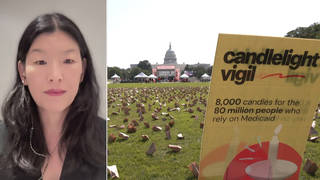
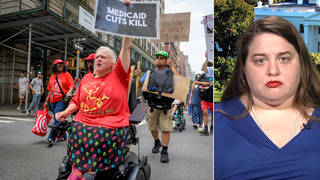
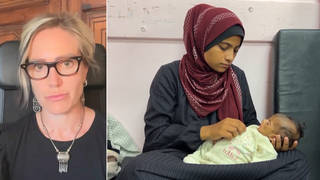
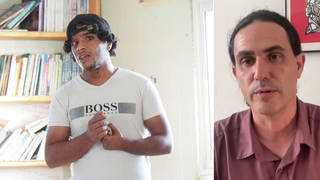







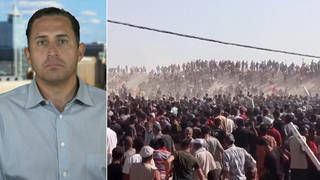
Media Options